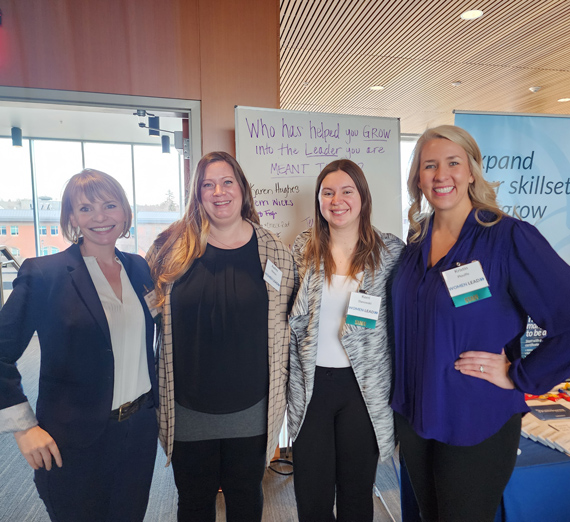Center For Lifelong Learning: Working Their Way Into a Crowded Market

Rachelle Strawther described an email the Center for Lifelong Learning (CLL) recently received from Mike Berg, who earned certificates in Women’s Leadership and Servant Leadership.
He discovered his need for leadership training when he was promoted at Amazon to a supervisory role and began working with five women who “were clearly smarter, more talented and better leaders than I. As a supervisor, it was a ludicrous position to be in, only having relatively more tenure than others. And it was somehow worse because we work in IT and had seen unthinkable attrition of female leaders. At a time when the team needed role models, they had me instead,” Berg wrote.
Several were promoted and three of the five women were recently honored with Amazon Women Engineering awards for outstanding work.
Berg is just one of hundreds of businesspeople, community leaders and industry experts who have received certificates from Gonzaga, and with it, an understanding of GU’s values and ethics.
Strawther is the founding director of CLL, which was established in 2021, developed and launched in September 2022. CLL began with five programs and in just 19 months has expanded to 15 certificates – five championed by the School of Leadership Studies, three in School of Business Administration, two in Engineering and Applied Science, and one each in Education, Law and the UW-GU Health Partnership.
“We meet with a group of professionals doing similar work across the country – most who got into this aspect of higher education long before we did – and they are amazed at how much support CLL receives from our campus partners – Marcom, GEM, IDD, ITS, Alumni, to name a few,” Strawther says.
Marketing is a major factor in CLL’s success in this very competitive marketplace, says Kristin Plouffe, assistant director and the person charged with building relationships with community and business leaders.
“We tap into organizations that have a desire to build relationships with Gonzaga,” Plouffe says. “Our strategy is to ask the leaders at these organizations to partner with us in helping to facilitate their needs rather than Gonzaga launching programs and hoping they fill.
Many companies pay for their employees to participate in these courses, Strawther says. As one recent example, Providence has sent 12 employees through the Certificate in Healthcare Leadership since its inception last year.
Gonzaga seeks industry leaders to teach in its CLL programs. Four years in the making, Professor Brian Henning worked with climate experts to craft the Certificate in Climate Action Planning and has created a network of experts to instruct people in the trade in need of climate sensitivity training.
For example, one high school graduate who had received promotions in the manufacturing professions and was now in a management position, needed training in how to hone his skills to become a better boss.
“Some people who have been working for a while might want some retooling,” Plouffe says. “Some may want to shift career directions but don’t have the luxury to take a couple years off to attain a new degree. Many want to learn how to be better leaders.”
Facing the cost of a degree and the impact of taking on more debt, a shorter course without losing work time is a win-win for working adults. The cost of a certificate program is about equal to the cost of one master’s degree class. And many of CLL’s programs can branch into degree programs as elective credits, upon admission and completion, Plouffe says.
Demand moves CLL’s decision-making in what programs to offer. Recent additions to CLL’s menu of certificate training include digital marketing, marketing analytics and project management. CLL offers 40 ways for K-12 teachers to earn clock hours. On the horizon is a program in customer service, based upon partner feedback, Plouffe says.
Playing major roles in CLL’s progress are Program Manager Kerri Danowski and Audrey Minton from Admissions Operations, who although doesn’t work in CLL, is a key player.
